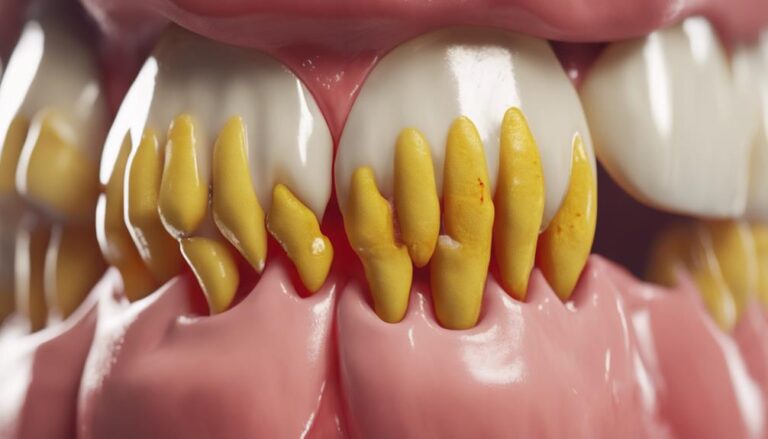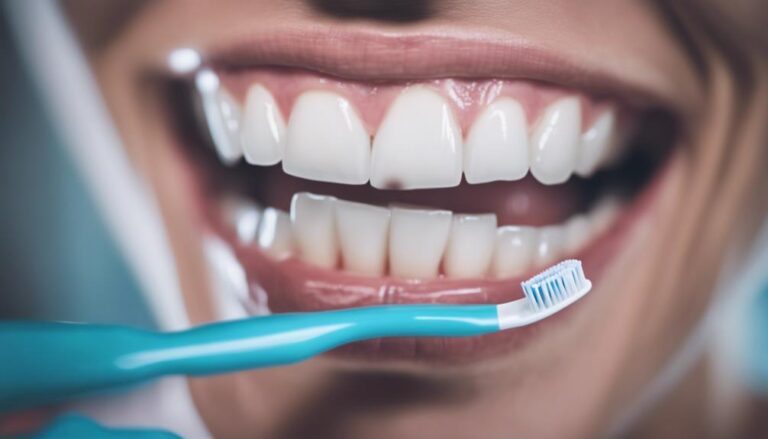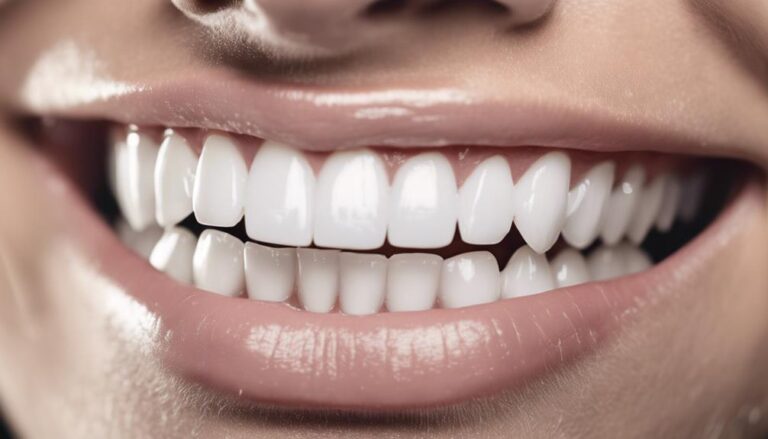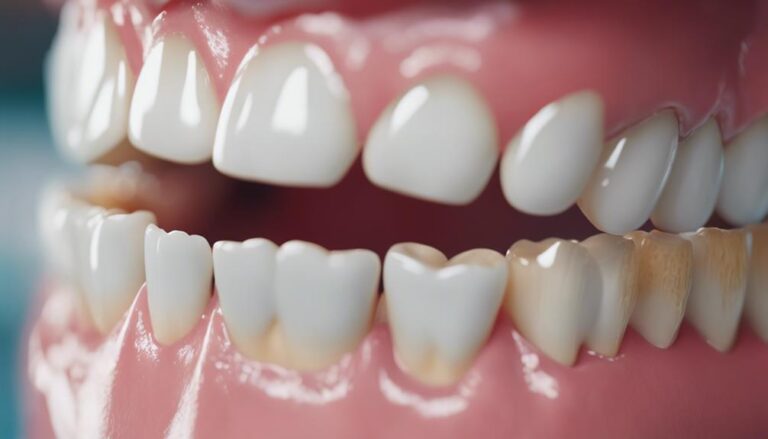When gum disease is present, bad breath can be a common symptom due to bacteria buildup. Plaque, a sticky film of bacteria, can irritate the gums and lead to inflammation. This inflammation, known as gingivitis, can progress to periodontitis if not addressed. Symptoms may include swollen, red gums, bleeding while brushing, and even loose teeth. Maintaining good oral hygiene practices like brushing, flossing, and regular dental check-ups can help prevent gum disease and its associated bad breath. Understanding the connection between gum disease and bad breath is essential for overall oral health care.
Key Takeaways
- Gum disease can cause bad breath due to bacterial growth in the mouth.
- Plaque buildup in the gums can lead to both gum disease and bad breath.
- Inflammation and infection in the gums from gum disease can result in persistent bad breath.
- Poor oral hygiene exacerbates gum disease, which can contribute to chronic bad breath.
- Treating gum disease effectively can help alleviate bad breath symptoms.
Gum Disease Overview
Gum disease, also known as periodontal disease, affects the tissues surrounding the teeth and is a common condition that can lead to serious oral health problems if left untreated. To prevent gum disease, maintaining good oral health habits is important. Brushing teeth at least twice a day with a fluoride toothpaste, flossing daily to remove plaque between teeth, and regular dental check-ups are essential components of gum disease prevention.
In addition to regular oral hygiene practices, a balanced diet low in sugary foods and beverages can help prevent gum disease. Consuming a variety of nutrient-rich foods such as fruits, vegetables, whole grains, and lean proteins can support overall oral health. Avoiding tobacco products is also crucial in preventing gum disease, as smoking can weaken the immune system and make it harder for the body to fight off infection in the gums.
Plaque Build-Up
Upon examining the teeth, one can detect a gradual build-up of plaque along the gumline, a sticky film composed of bacteria and food particles that, if not removed, can contribute to gum disease and bad breath. To prevent plaque build-up and maintain oral health, regular brushing and flossing are essential. Additionally, professional dental cleanings every six months can help remove hardened plaque, known as tartar, that cannot be removed through regular oral hygiene practices. Below is a table outlining key strategies for plaque prevention and oral health maintenance:
| Plaque Prevention Tips | Oral Health Maintenance |
|---|---|
| Brush teeth twice a day | Visit the dentist regularly |
| Floss daily | Use fluoride toothpaste |
| Limit sugary and starchy foods | Rinse with mouthwash |
| Chew sugar-free gum | Eat a balanced diet |
Gingivitis Development
The gradual development of gingivitis, a common precursor to more severe gum diseases, underscores the importance of proactive oral care measures.
Gingivitis is characterized by inflammation of the gums, often caused by the accumulation of plaque – a sticky film of bacteria that forms on teeth. Poor oral hygiene is a primary factor in the development of gingivitis. Symptoms include red, swollen gums that may bleed easily, particularly during brushing or flossing. It’s essential to address gingivitis promptly to prevent its progression into more severe periodontal diseases.
Maintaining excellent oral health is key to preventing gingivitis. Regular brushing with fluoride toothpaste, flossing daily, and scheduling routine dental check-ups are essential preventive care measures. Additionally, a balanced diet low in sugary foods and regular dental cleanings can help keep gingivitis at bay.
Early detection and treatment are crucial in managing gingivitis effectively, as it can lead to more serious complications if left untreated. Prioritizing oral hygiene and seeking professional dental care are fundamental steps in combating gingivitis and promoting overall oral health.
Periodontitis Progression
As periodontitis progresses, the inflammation and infection extend beyond the gums into the supporting structures of the teeth. This stage is more severe than gingivitis and requires immediate attention to prevent further complications. Here are key points to keep in mind:
- Periodontitis Prevention: Implementing good oral hygiene practices such as regular brushing, flossing, and routine dental check-ups can help prevent the progression of periodontitis.
- Treatment Options: Seeking professional treatment is vital for managing periodontitis. Treatments may include deep cleaning procedures like scaling and root planing, antibiotics, and in severe cases, surgery to repair damaged tissues.
- Gum Disease Complications: If left untreated, periodontitis can lead to tooth loss, bone damage, and systemic health issues like cardiovascular disease. Proper management is crucial to prevent these complications.
Understanding the progression of periodontitis and the importance of prevention and treatment is essential for maintaining oral health and overall well-being.
Bacteria Growth
Bacteria growth in the oral cavity plays a significant role in the development and progression of gum disease, contributing to inflammation and tissue damage. Controlling the growth of bacteria is essential in preventing the onset of periodontitis. Harmful bacteria, such as Porphyromonas gingivalis, can form biofilms on the teeth and below the gumline, triggering an immune response that leads to chronic inflammation. This inflammation damages the gum tissue and, if left untreated, can progress to periodontitis, causing irreversible damage to the supporting structures of the teeth.
One effective way to control bacteria growth in the mouth is by using antibacterial mouthwashes. Mouthwashes containing ingredients like chlorhexidine or essential oils have been shown to reduce the levels of harmful bacteria in the oral cavity, helping to prevent gum disease. Incorporating mouthwash into your daily oral hygiene routine can complement brushing and flossing, providing an extra layer of protection against bacterial overgrowth and maintaining overall oral health.
Oral Hygiene Impact
Maintaining good oral hygiene habits is essential for preventing gum disease and bad breath. The impact of oral hygiene on our overall health can’t be overstated. Here are some key points to keep in mind:
- Impact on Prevention: Proper oral care strategies, such as brushing at least twice a day and flossing daily, can greatly reduce the risk of developing gum disease and experiencing bad breath.
- Oral Care Strategies: Regular dental check-ups and cleanings play an important role in preventing gum disease and addressing any potential issues early on. Using antimicrobial mouthwash can also help control bacteria that lead to bad breath.
- Overall Health Connection: Research has shown a link between poor oral health and systemic conditions like cardiovascular disease. Taking care of your oral health not only prevents gum disease and bad breath but also contributes to your overall well-being.
Halitosis Connection
Exploring the connection between halitosis and gum disease sheds light on the importance of oral health in addressing bad breath concerns. Maintaining good oral health through proper brushing, flossing, and regular dental check-ups is vital in preventing gum disease, which can be a significant contributor to halitosis. In addition to oral hygiene, factors such as diet, stress, and medication can also influence the presence of bad breath.
| Factors | Impact on Halitosis |
|---|---|
| Oral Health | Proper oral hygiene practices help prevent gum disease, a common cause of halitosis. |
| Diet | Certain foods, like onions and garlic, can contribute to bad breath. Drinking water and eating crunchy fruits and vegetables can help combat halitosis. |
| Stress | High stress levels can lead to dry mouth, which can exacerbate bad breath. Stress management techniques may help reduce this effect. |
| Medication | Some medications have side effects that include dry mouth, which can increase the likelihood of halitosis. Consult with a healthcare provider if medication is causing bad breath issues. |
Breath Odor Factors
Considering various factors that contribute to breath odor can provide insights into effective strategies for managing halitosis. When it comes to the root causes of bad breath, two significant factors play an important role: food particles and dry mouth.
- Food particles: Food particles left in the mouth after eating can become trapped between teeth or along the gumline. Bacteria in the mouth break down these food particles, releasing foul-smelling gases that contribute to bad breath.
- Dry mouth: Saliva plays an essential role in cleaning the mouth by washing away food particles and bacteria. When the mouth is dry, due to factors like medication, mouth breathing, or dehydration, there’s less saliva production. This leads to an accumulation of bacteria and food particles, resulting in bad breath.
Understanding how these factors can contribute to halitosis is essential in developing effective strategies to combat bad breath. By addressing issues related to food particles and dry mouth, individuals can take proactive steps to improve their breath odor.
Chronic Bad Breath
Essential
Chronic bad breath, also known as halitosis, is a persistent condition characterized by unpleasant breath odor that lingers despite oral hygiene efforts. It can be a result of various factors, including poor oral hygiene and lifestyle habits. Neglecting regular brushing and flossing allows bacteria to thrive in the mouth, leading to the production of foul-smelling compounds. Additionally, certain lifestyle habits like smoking, consuming pungent foods, or dry mouth can exacerbate chronic bad breath.
Maintaining good oral hygiene practices is essential in combating halitosis. Brushing your teeth twice a day, flossing daily, and using mouthwash can help eliminate food particles and bacteria that contribute to bad breath. Regular dental check-ups are also essential to address any underlying dental issues that may be causing chronic bad breath.
In addition to oral hygiene, adopting healthy lifestyle habits such as drinking plenty of water, avoiding tobacco products, and following a balanced diet can play a significant role in preventing and reducing chronic bad breath. By addressing these factors, individuals can effectively manage halitosis and enjoy fresher breath.
Gum Inflammation
Poor oral hygiene practices can lead to gum inflammation, a common condition characterized by redness and swelling of the gum tissue. When the gums become inflamed, it can indicate an underlying issue with oral health that needs attention.
Here are a few key points to keep in mind:
- Importance of Oral Health: Maintaining good oral hygiene practices, such as regular brushing, flossing, and dental check-ups, is essential in preventing gum inflammation and other oral health issues.
- Signs and Symptoms: Gum inflammation can manifest as redness, swelling, tenderness, and sometimes bleeding of the gums. These symptoms shouldn’t be ignored and warrant a visit to the dentist for evaluation.
- Impact on Gum Health: Untreated gum inflammation can progress to more severe forms of gum disease, leading to potential tooth loss and systemic health implications. Proper care and attention to gum health are necessary in preventing further complications.
Understanding the relationship between oral health and gum inflammation is important for maintaining overall health and well-being. Regular dental visits and a consistent oral hygiene routine can help prevent and manage gum inflammation effectively.
Pus Formation
Pus formation in the gums is a concerning sign of advanced gum disease that requires prompt attention from a dental professional. When pus, a thick fluid containing dead tissue, white blood cells, and bacteria, is present in the gums, it indicates a severe bacterial infection. This infection is often a result of untreated gum disease, also known as periodontal disease.
Oral health is directly linked to overall health, making it vital to address pus formation promptly. Ignoring this symptom can lead to further complications, such as tooth loss and bone damage. The bacterial infection causing pus formation can spread to other parts of the body, impacting systemic health.
To effectively manage pus formation in the gums, a dental professional will conduct a thorough examination to determine the extent of the infection. Treatment may involve deep cleaning procedures, antibiotics, and in severe cases, surgical intervention. Maintaining good oral hygiene practices and attending regular dental check-ups are essential in preventing gum disease and the associated complications of pus formation.
Receding Gums
With regards to oral health, noticing a gradual loss of gum tissue is a common indication of a condition known as receding gums. Receding gums can lead to sensitivity, increased risk of decay, and aesthetic concerns.
To address this issue effectively, consider the following:
- Maintain Good Oral Hygiene: Proper brushing and flossing can help prevent gum recession by reducing plaque buildup.
- Regular Dental Check-ups: Routine dental visits allow for early detection of gum recession and implementation of appropriate treatment.
- Avoid Aggressive Brushing: Brushing too hard can wear down the gums, contributing to recession.
Prevention strategies play an important role in managing receding gums. Additionally, seeking professional assistance for receding gum treatment, such as deep cleaning or surgical procedures, can help restore gum health.
Tooth Decay Risk
To evaluate the risk of tooth decay, it is important to understand the factors that contribute to dental caries formation. Maintaining good dental hygiene practices is vital for cavity prevention and overall tooth health. One notable factor that influences tooth decay risk is sugar intake. Bacteria in the mouth feed on sugars, producing acids that attack tooth enamel and lead to cavities. Limiting sugary foods and drinks can help reduce this risk greatly.
| Factors | Impact on Tooth Decay Risk |
|---|---|
| Sugar Intake | Increases risk |
| Dental Hygiene | Decreases risk |
| Fluoride Use | Decreases risk |
| Regular Dental Visits | Decreases risk |
| Genetics | May impact susceptibility |
Proper dental hygiene, including brushing twice a day, flossing, and using mouthwash, is essential for preventing tooth decay. Fluoride, found in toothpaste and some water sources, helps strengthen enamel and reduce cavities. Regular dental check-ups can catch early signs of decay and prevent further damage. While genetics can play a role in tooth decay susceptibility, maintaining good oral care habits can help mitigate this risk.
Taste Changes
As we consider the impact of oral health on overall well-being, one noticeable aspect that may arise is changes in taste perception. Taste changes can be a symptom of gum disease and can affect one’s quality of life greatly. When gum disease progresses, it can impact taste buds and alter the way we perceive flavors. This can lead to a diminished enjoyment of food and drinks, affecting nutrition and overall well-being.
- Taste buds: Gum disease can affect the sensitivity of taste buds, leading to a distorted taste perception.
- Saliva production: Reduced saliva production, which can occur in gum disease, can also contribute to taste changes as saliva plays an important role in helping us taste and digest food.
- Overall oral health: Taste changes can serve as an early indicator of gum disease, prompting individuals to seek professional help and prevent further oral health complications.
Monitoring changes in taste perception can provide valuable insights into one’s oral health status, highlighting the importance of early intervention and preventive care.
Treatment Options
Treatment options for gum disease and its associated taste changes include various interventions that aim to restore oral health and improve taste perception.
Dietary adjustments play an important role in managing gum disease and taste alterations. Consuming a balanced diet rich in vitamins, minerals, and antioxidants can aid in gum health and overall oral well-being. Additionally, avoiding sugary and acidic foods can help prevent further deterioration of the gums.
Mouthwash solutions containing antibacterial properties are beneficial in reducing plaque buildup and combating bad breath associated with gum disease. Rinsing with an antimicrobial mouthwash can help alleviate taste changes caused by oral infections.
Lifestyle changes such as quitting smoking and reducing stress levels can significantly enhance gum disease symptoms and taste perception. Smoking cessation promotes better circulation and allows the gums to heal more effectively. Stress management techniques can also aid in reducing inflammation in the mouth.
Regular professional cleanings by a dentist or dental hygienist are essential in treating gum disease. These cleanings help remove plaque and tartar buildup, preventing further progression of the condition and improving taste sensations.
Frequently Asked Questions
Can Gum Disease Be Linked to Other Health Conditions?
Gum disease can indeed be linked to other health conditions. Poor oral health can impact overall health. It’s essential to maintain good dental hygiene to prevent potential systemic issues that may arise from untreated gum disease.
Is Bad Breath Always a Sign of Gum Disease?
Is bad breath always a sign of gum disease? Good oral hygiene and diet play an important role. Medical conditions can also lead to halitosis. Regular dental check-ups help maintain oral health and can detect any underlying issues contributing to bad breath.
How Can Stress Affect Gum Disease and Bad Breath?
Stress impacts oral health by weakening the immune system, making gums more susceptible to disease. It can exacerbate gum disease and bad breath. Understanding the relations between stress and oral health is essential for maintaining overall wellness.
Are There Specific Foods That Worsen Bad Breath?
Yes, certain foods like onions and garlic can exacerbate bad breath. Proper dietary habits and maintaining good oral hygiene are essential. Avoiding smoking and alcohol, staying hydrated, and using halitosis treatments like mouthwashes can help combat bad breath effectively.
Can Genetics Play a Role in Developing Gum Disease and Bad Breath?
Genetics can definitely influence oral health. A family history of gum disease could increase the risk of developing it. Understanding these genetic factors can help in preventive care and maintaining good oral hygiene habits.
Conclusion
Just like a neglected garden can lead to weeds and pests, neglecting your oral health can lead to gum disease and bad breath.
By understanding the causes and symptoms of gum disease, such as plaque build-up and bacteria growth, you can take proactive steps to prevent these issues.
Don’t let your oral health become overgrown and unkempt – prioritize regular dental care to keep your smile healthy and fresh.






